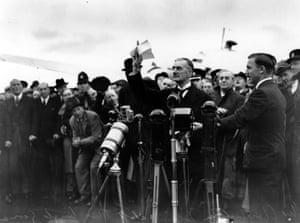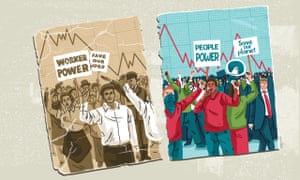Extract from The Guardian
Opinion
Echoes of a horrific decade are getting louder, and the UN climate accord is the equivalent of Chamberlain’s piece of paper
More than any other decade, the 1930s
act as a reference point for just how bad things can get. Mass
unemployment, totalitarianism, war: a repeat of these horrors is to be
avoided at all costs. Eighty years after Neville Chamberlain agreed to
Hitler’s demands over the Sudetenland, there is still no greater insult
than to dub a politician an “appeaser”.
The determination in policy circles to avoid a return to the 30s helps explain why up until now it has never happened. Central banks slashed interest rates and turned on the electronic printing presses a decade ago because they feared a second Great Depression. Welfare states are more generous than they were when John Steinbeck was writing The Grapes of Wrath. Decades of growth have made societies wealthier; advances in medical science have made them healthier.
That said, the world is currently closer to a return to the 30s than it has ever been. The echoes are loud and getting louder.
Let’s start with the obvious. As it did in the period between the two world wars, something has gone seriously wrong with the global economy. The story of the past 20 years has been that of an unsustainable boom followed by a deep recession and the weakest recovery in history.
Central banks have applauded themselves for preventing Great
Depression 2.0, but what they never admit is that they did so by
creating asset bubbles. A prolonged period of ultra-low interest rates
and quantitative easing – the bond-buying process that boosts the supply
of money – led to a speculative frenzy for commodities, shares and
property. Those bubbles are now starting to pop. Oil prices are
crashing, house prices are flat, shares on Wall Street are on course to
have their worst December since 1931.The determination in policy circles to avoid a return to the 30s helps explain why up until now it has never happened. Central banks slashed interest rates and turned on the electronic printing presses a decade ago because they feared a second Great Depression. Welfare states are more generous than they were when John Steinbeck was writing The Grapes of Wrath. Decades of growth have made societies wealthier; advances in medical science have made them healthier.
That said, the world is currently closer to a return to the 30s than it has ever been. The echoes are loud and getting louder.
Let’s start with the obvious. As it did in the period between the two world wars, something has gone seriously wrong with the global economy. The story of the past 20 years has been that of an unsustainable boom followed by a deep recession and the weakest recovery in history.

To make matters worse, the distribution of income and wealth has mirrored that of the period between the wars. Real wages – adjusted for inflation – have barely risen for those on low and middle incomes; such growth as there has been has been snaffled by the better off. If you own a home or own shares, the past decade has been good for you. If you are in a low-wage job with only modest savings, life has not been nearly so comfortable.
All these factors – economic underperformance, the return to business as usual and the sense that we are not all in this together – have given rise to a different sort of politics: nationalistic, populist and angry. People in the 30s were susceptible to the cult of the strongman leader because parties of the centre-left and centre-right seemed impotent in the face of a financial crisis, triggered by the Wall Street crash. Now that cult – Putin in Russia; Modi in India; Erdoğan in Turkey; Trump in the US; Bolsonaro in Brazil – is back and for the same reason. Voters are no longer convinced that mainstream politics can deliver.
Protectionism is back, and, although Trump’s trade war with China is so far more of a trade skirmish, the direction of travel is clear. “America first” is the modern-day equivalent of US isolationism in the 20s and 30s. Governments that pledge to look after their own – through tariffs or immigration controls – have tapped into a genuine sense of unease about how the fruits of globalisation have been divvied up.
The 40s and 50s saw the creation of a network of multilateral organisations designed to prevent a return to the beggar-thy-neighbour world of the 30s and to embed the new social democratic order. These institutions – the International Monetary Fund, the World Bank, the World Trade Organization (conceived in the 1940s but created decades later) and the European Union – have all to a greater or lesser extent been captured by neoliberal ideology and by big business interests. Faith in international cooperation has frayed.
One seeming difference between the 2010s and the 1930s is the absence of an ideological clash. During the Great Depression, there were plenty of people in the west who saw Stalin’s five-year plans as a credible alternative to free-market capitalism. That struggle ended with the collapse of the Soviet Union and the spread of the market to parts of the world where it had previously been off limits.
In fact, there is a challenge to free-market capitalism and it is coming from environmentalism. On the one hand, there is an ideology that prioritises growth; on the other a belief system that sees the obsession with growth as an existential threat to the planet.
Britain’s fixation with Brexit means it is easy to portray Theresa May as Chamberlain and to see the prime minister’s recent abortive trip to the EU summit as her Munich. This, though, misses the bigger picture. Brexit is not the most important issue facing the world; it is not even the most important issue facing Britain.
Governments are aware of the risk posed by climate change. They know that they need to change the way their economies are run in order to hit targets for capping carbon emissions. They understand that time is not on their side. Yet at the UN summit in Poland they came up with an agreement they knew was inadequate to meet the challenge.
Katowice was the real Munich and the feeble UN accord the equivalent of the piece of paper Chamberlain brought back home with him from his meeting with Hitler. Appeasement doesn’t work and merely delays necessary policy action. That was true in the late 30s and it is true again today. Ultimately, policymakers have a choice. They can put their economies on an environmental war footing or they can continue to bottle it. In the 30s, they acted in time, but only just. For today’s appeasers, the moment of truth is nigh.
• Larry Elliott is the Guardian’s economics editor

No comments:
Post a Comment